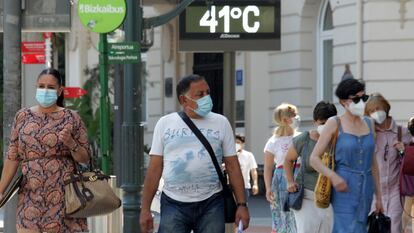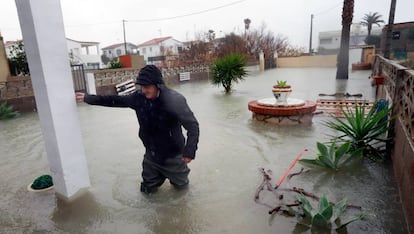Global warming accelerates in Spain: average temperature rises 1.3ºC in 60 years
The national weather agency Aemet warns that despite the slowdown from the coronavirus pandemic, the concentration of carbon reached levels in 2020 that hadn’t been seen for 800,000 years


Global warming is happening at an accelerating rate in Spain. In 2020, the average temperature in the country was 1.7 degrees Celsius higher than the average in preindustrial times, between 1850 and 1900. What’s more, the rate of warming has accelerated in the last few decades, rising a cumulative 1.3ºC in 60 years. That’s according to the executive report on the state of the climate in Spain in 2020, presented by the Spanish weather agency Aemet on Friday. The report warns that if greenhouse emissions continue at their current rate, the average temperature will rise 5ºC by the end of the century.
Limiting global warming to well below 2ºC by reducing greenhouse gas emissions is the central goal of the 2015 Paris Agreement on climate change. Nearly half of all gases emitted accumulate in the atmosphere, which accelerates global warming, while the other 50% are absorbed by oceans and forests. In its report, Aemet explains that although the coronavirus lockdown led to a big drop in business activity and travel, the concentration of greenhouse gases continued to rise in 2020. In the case of carbon dioxide, the concentration rose to levels not seen in 800,000 years, according to the World Meteorological Organization.
“There can’t be public health without the base of a healthy environment,” said Hugo Morán, Spain’s secretary of state for the environment, during the presentation of the report. In his opinion, the Aemet study on climate indicators is “part of the medical checkup of our reality.”
This reality includes the hottest years recorded in the last decade in Spain. According to Aemet spokesperson Rubén del Campo, 2020 together with 2017 was the hottest year Spain has registered since the agency began to keep records in the 1960s. The average temperature in 2020 was 14.7ºC. Similar highs were recorded in the rest of the world, even though the La Niña phenomenon – the colder counterpart of El Niño – “should have helped to make the temperatures colder,” explained Beatriz Hervella, another Aemet spokesperson.

Future risks
The Aemet report indicates that, based on its models, the global temperature will rise 5ºC above pre-industrial levels by the end of the century if greenhouse emissions continue at their current rate. To put this in context, Del Campo explained that in 2003, during the worst summer recorded to date in Europe, temperatures were only 3ºC above average.
According to the report, Spain saw three heatwaves in the summer of 2020, one of which lasted nine days, making it the longest heatwave recorded since 1975. The rising number of heatwaves is one of the most noticeable effects of the global climate crisis. Del Campo said that the number of records broken for high temperatures has also skyrocketed in the last decades. “Now there are 11 times as many records of high temperatures than records for cold temperatures,” he said.
In the report, Aemet also highlighted the impact these phenomena have on health. According to studies by the Carlos III Health Institute, around 1,800 people have died as a result of extreme heat in the last five years.
The study also looks at the rising sea temperatures in Spain. According to Aemet, the average temperature of the waters around the country has risen 0.5ºC above the norm. This is based on data from Copernicus, a scientific service from the European Commission. In 2020, surface sea temperatures were the second-highest they have been ever.
Scientific studies indicate that rising sea temperatures could lead to new and more extreme weather phenomena, such as some types of storms. Although rainfall in Spain in 2020 was within normal values, the country did register a very extreme weather event: Storm Gloria. This storm, which hit in January, devastated coastal areas along the Mediterranean with record rainfall, wind and waves. “Spain is one of the danger zones of climate change,” warned Hervella, referring to the impacts that are already being felt in the country.
English version by Melissa Kitson.
Tu suscripción se está usando en otro dispositivo
¿Quieres añadir otro usuario a tu suscripción?
Si continúas leyendo en este dispositivo, no se podrá leer en el otro.
FlechaTu suscripción se está usando en otro dispositivo y solo puedes acceder a EL PAÍS desde un dispositivo a la vez.
Si quieres compartir tu cuenta, cambia tu suscripción a la modalidad Premium, así podrás añadir otro usuario. Cada uno accederá con su propia cuenta de email, lo que os permitirá personalizar vuestra experiencia en EL PAÍS.
¿Tienes una suscripción de empresa? Accede aquí para contratar más cuentas.
En el caso de no saber quién está usando tu cuenta, te recomendamos cambiar tu contraseña aquí.
Si decides continuar compartiendo tu cuenta, este mensaje se mostrará en tu dispositivo y en el de la otra persona que está usando tu cuenta de forma indefinida, afectando a tu experiencia de lectura. Puedes consultar aquí los términos y condiciones de la suscripción digital.








































